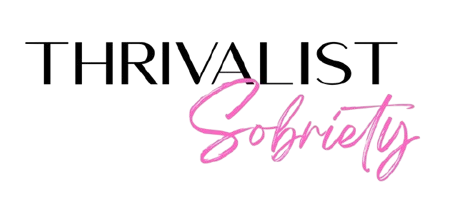
Why can’t I stop drinking?
When I was struggling with alcohol, I asked myself this question often: Why can’t I stop drinking?
Although it felt like I couldn’t stop, the reality was, I was really good at stopping. The not starting again was the real issue.
In this post I unpack common problems that hold us back from achieving sustained sobriety. Some or all of which may apply to you. And I offer solutions that have helped me, and many other women, to kick alcohol to the curb for good.
Problem 1: You’re relying on willpower alone to stop
Ever heard of the term “white-knuckling”? That’s when you’re trying not to drink despite desperately wanting to. You’re holding on for dear life, turning your proverbial knuckles white.
Willpower is a limited resource, meaning it runs out. So when you decide to quit drinking and do nothing else to support yourself through this massive lifestyle change, your willpower may allow you to resist alcohol for a few days or even a few weeks, but sooner or later you find yourself caving in. The weight of the desire to drink, crushing your depleted willpower reserves.
Solution 1: Proactively remove your desire to drink
To achieve sustained sobriety, the key is to proactively work on removing the desire to drink.
We only desire something if we think it benefits us. If we don’t see any benefit to doing something, we don’t desire it, and therefore we don’t crave it. Think about it, you don’t get cravings to drink bleach, do you? Of course not. You see absolutely no benefit to drinking it, therefore you don’t desire it and don’t crave it. This is the kind of attitude we’re aiming to cultivate towards alcohol. One which eliminates willpower from the equation.
The way to do this is to unpick all the untrue beliefs you hold about alcohol being beneficial to you. You know the ones: I need alcohol to relax, I need alcohol to socialise, I need alcohol to have fun, etc. Once you learn the truth that there is no benefit to drinking alcohol, ever, you’ll find it much less desirable.
There are some brilliant books out there that help you do this. As part of our eight-week course, we get all of our students to read This Naked Mind, by Annie Grace, for this very purpose.
Problem 2: You’re not prepared
You know the saying ‘Fail to plan, plan to fail’? That’s what many of us do when we try to quit.
We don’t take the time to learn practical tools and strategies to help us move through alcohol cravings, we don’t identify our triggers and plan what we’ll do instead of drink when they arise, we don’t think about what alcohol-free drinks we’ll consume instead of our usual boozy ones, we don’t tell our loved ones what we’re doing and ask for their support, we don’t plan what we’ll say to people when they ask why we’re not drinking, we don’t take the time to figure out what our deepest motivating drivers are for making this change, and we don’t identify all the reasons we reach for a drink, so that we can proactively address those needs in healthier ways.
As I often say, you can’t simply decide that you’re not going to drink anymore and expect that to be enough. It’s not enough.
Solution 2: Get prepared!
Doing the vital preparatory work goes a long way towards sustained sobriety.
If you’re thinking “That sounds like a lot of work!”, you’re right. Getting sober takes work. But it’s work worth doing because the benefits are insane. And the work turns into a rewarding and enjoyable journey as you learn more about yourself, your needs and how to fulfil them in wholesome ways.
Problem 3: You romanticise your drinking
You know the cycle. You wake up feeling like death warmed up and decide that drinking isn’t worth it anymore. Maybe you take a day or two off while you recover, but before you know it, you’re fantasising about how good a drink would be. How great it’ll make you feel. How fun it’ll be. The power of that dreadful hangover suddenly minimised by the romantic notion of wine with dinner, or the cheekiness of cocktails with the girls.
There is a name for this ‘amnesia’ that makes us forget how horrible the negatives of drinking are. Fading Affect Bias (FAB), also known as Euphoric Recall, is the culprit.
FAB is a psychological phenomenon that makes us forget memories associated with negative emotions much faster than memories associated with positive ones. What this means is, the memory of that dreadful hangover is forgotten long before the positive memory of clinking glasses with friends. Essentially, you’re recalling the good without its associated bad. Which leads to you downplaying the bad and chasing the good. Again, and again.
Solution 3: Cut through Fading Affect Bias
A powerful way to cut through FAB is to write your future self a letter when you’re in the horrors of drinking. It’s a way of saying to your future self (who’s romanticising drinking):
“Hey! When you start thinking about drinking again – read this. This is why we’re stopping. This is why we’re not doing this anymore. Let’s not forget that it was bad enough to make us want to stop in the first place. Let me refresh your memory!”
Then you go on to flesh out in as much detail as possible and using emotive language, why drinking doesn’t work for you.
Next time FAB kicks in, you’re armed with your letter which refreshes your memory as to the reality of your drinking. It taps into your ‘why’, your deep motivators for not wanting to drink anymore, which helps you to choose short-term discomfort for long-term gain.
Problem 4: You think you need to have ‘a problem’ to quit
People tend to lump drinkers into two categories. Normal drinkers and alcoholics. White and black, with no grey-area in between. The unwritten rule seems to be that no one quits drinking unless they have to because they have a problem. If you don’t obviously have a problem, then the general consensus is that you keep drinking. Sure, you can cut down, reign it in, moderate. But you don’t quit.
This black and white thinking keeps many drinkers stuck. They think that because they don’t fit the problem-drinker stereotype, sobriety isn’t for them. They don’t realise that Alcohol Use Disorder (AUD), the clinical diagnosis given to problem drinkers, consists of a spectrum ranging from mild to severe. And along which many drinkers who classify themselves as ‘normal drinkers’ would sit.
The truth is, you don’t need any label or diagnosis to justify quitting a dangerous and addictive drug (that’s alcohol by the way). You don’t need to have a drinking problem for alcohol to have become a problem for you.
Solution 4: Understand that sobriety is available to any one
Changing your mindset from thinking you need to have a problem with alcohol to quit it, to realising that sobriety is available to everyone and anyone is an important shift.
If alcohol has started to take more than it gives you, if it’s holding you back from reaching your potential, if your intuition is guiding you to take a break, or if alcohol is preventing you from showing up as the best version of yourself, then any of these reasons is enough.
It’s less about whether your drinking is ‘bad enough’ to quit. It’s more about whether your life, with alcohol in it, is good enough for you to stay the same.
Problem 5: You’re trying to do it alone
Most of us don’t have many (or any!) sober friends when we embark on our quest to quit drinking. We feel like the only person on planet earth who’s struggling with alcohol.
Everyone around us seems to drink. Which is not surprising because we tend to surround ourselves with people who drink like us. So, when we decide not to drink anymore, it can be an incredibly lonely endeavour.
Without the support of other like-minded sober sisters, we can feel like a social leper. And because of our very real need for human connection, we can find ourselves drinking again purely to fit in (or, should I say, to avoid the discomfort of feeling like we don’t).
Solution 5: Get support
You are NOT the only person on planet earth trying to get sober. There are thousands and thousands of others just like you out there. Sobriety is trending right now!
Connecting with like-minded people who really get how you feel, and share the same goals as you, is beyond game-changing.
YOU DO NOT HAVE TO DO THIS ALONE. Of course, you can. It’s just a hell-of-a-lot harder.
Besides Thrivalist, there are tonnes of communities out there waiting to support your alcohol-free journey. From private Facebook groups, Instagram accounts, other sobriety and mindful drinking programs, to traditional meetings, and sober meet-ups, your tribe is out there!
This is not an exhaustive list of ways that we hold ourselves back from sobriety. It’s just the start. The process of attaining sustained sobriety looks different for everyone. There is no single magic bullet. The key is to keep trying. Through trial and error, you will figure out what works for you and what doesn’t. The important thing is to never quit quitting.

Post a comment